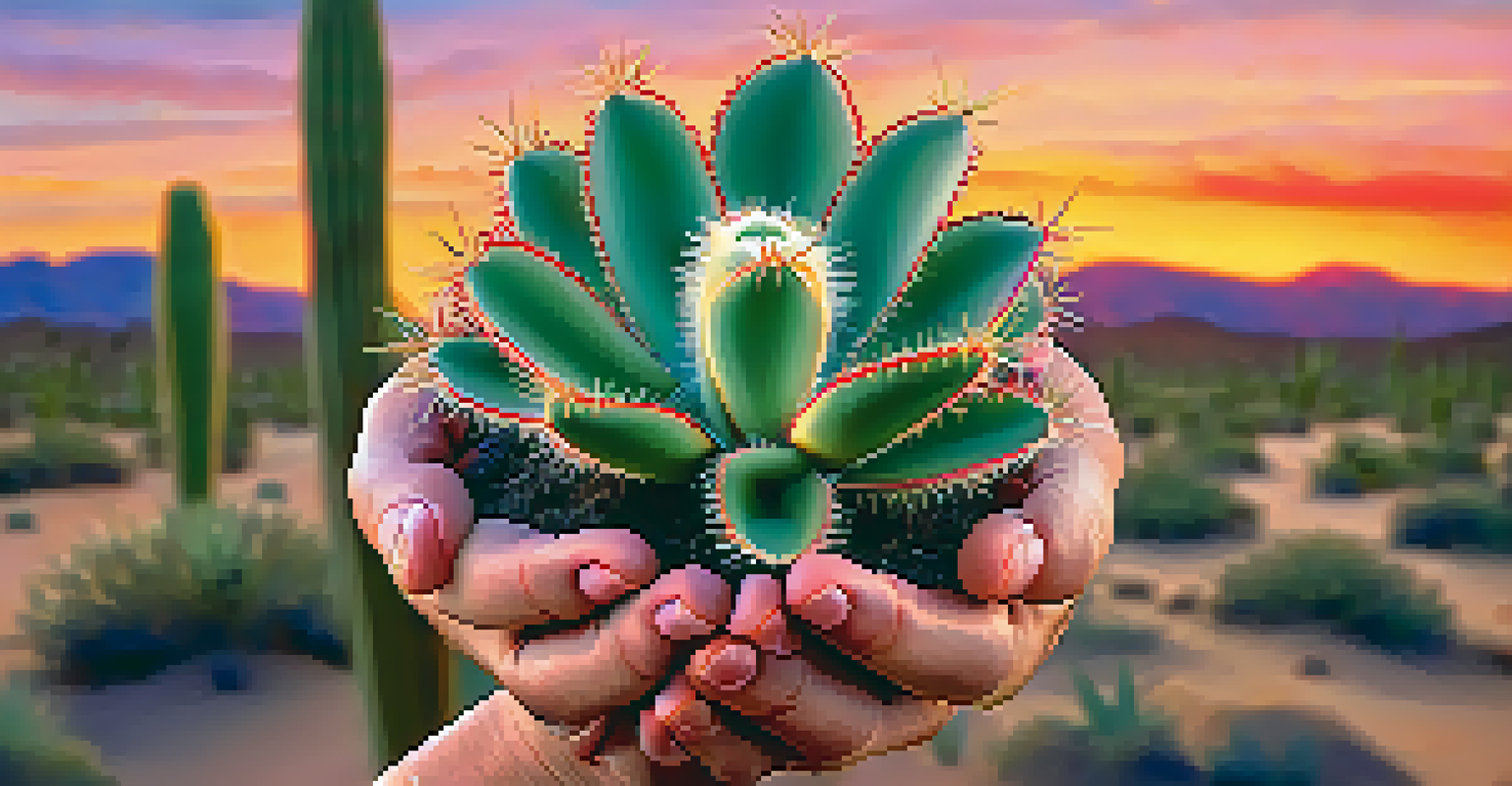The Ethics of Using Entheogens: A Cultural Perspective

Understanding Entheogens: More Than Just Substances
Entheogens are substances, often derived from plants, that are used in spiritual or religious contexts. They can induce altered states of consciousness, allowing individuals to explore the depths of their psyche. Many cultures have historically used these substances in rituals, believing they connect them with higher realms or divine entities.
The use of entheogens in a therapeutic setting is not merely about the substances themselves, but the cultural narratives and ethical frameworks that surround them.
For example, Indigenous tribes in the Amazon have utilized ayahuasca for centuries as a means of healing and spiritual guidance. This practice isn’t merely recreational; it is deeply embedded in their cultural identity and worldview. By understanding entheogens in this light, we can appreciate their significance beyond the Western lens of recreational drug use.
Recognizing the cultural context of entheogen use is essential to discussing ethics. It invites us to consider not just the substance itself, but the traditions, beliefs, and values that surround its consumption.
Ethical Considerations in Cultural Appropriation
As entheogens gain popularity in Western societies, concerns about cultural appropriation arise. Many practitioners from non-Western cultures feel that their sacred traditions are being commodified and stripped of their meaning. This raises important ethical questions about who has the right to use these substances and in what context.

For instance, when individuals partake in ayahuasca retreats without understanding its cultural significance, it can lead to a superficial experience. This not only disrespects the tradition but also risks misrepresenting its powerful effects. It’s crucial to approach such practices with respect and a willingness to learn.
Cultural Context Matters
Understanding entheogens requires recognizing their cultural significance and the traditions surrounding their use.
In essence, engaging with entheogens ethically requires mindfulness and respect for the cultures from which they originate. This means recognizing the historical and spiritual narratives tied to these practices and ensuring that their use honors, rather than exploits, those traditions.
The Role of Consent and Informed Use
In any discussion of ethics, consent is paramount. When it comes to entheogens, informed consent means understanding not just the substance, but also the potential psychological and spiritual implications. Participants should be fully aware of what they are engaging in and the risks involved.
To respect the power of these plants is to understand their place in the traditions that have honored them for generations.
Consider the stories of those who have undergone transformative experiences with entheogens; many emphasize the importance of preparation and guidance. For instance, shaman-led ceremonies often involve extensive pre-ceremony discussions to ensure participants are ready and informed. This framework can enhance safety and deepen the spiritual experience.
Thus, creating an environment that prioritizes informed consent is crucial. It empowers individuals to make decisions that honor their well-being and the cultural practices surrounding entheogen use.
Therapeutic Use Versus Recreational Use: A Fine Line
The therapeutic potential of entheogens has garnered significant attention, especially in mental health treatment. However, this raises ethical questions about differentiating between therapeutic use and recreational use. While both can offer benefits, the intentions and contexts differ drastically.
For example, psilocybin has shown promise in treating depression and anxiety, but its use in clinical settings is vastly different from casual consumption at a party. The former involves careful monitoring and guidance, while the latter often lacks structure and purpose. This distinction is vital in ensuring that the use of entheogens remains ethical and beneficial.
Informed Consent is Key
Participants in entheogen practices must be fully informed about the substances and their potential effects to ensure ethical engagement.
Therefore, as we explore the therapeutic applications of entheogens, it’s essential to maintain clear ethical boundaries that respect their traditional uses and promote safe practices.
Cultural Narratives: The Impact of Storytelling
Cultural narratives play a pivotal role in shaping our understanding of entheogens. Stories passed down through generations often encapsulate the values and lessons tied to their use. These narratives help contextualize the experiences individuals have with these substances, transforming them into collective wisdom.
For instance, in many Indigenous cultures, the stories surrounding peyote use are rich with teachings about nature, community, and the spiritual world. These narratives not only provide a framework for understanding the experiences but also emphasize the importance of community and respect for the earth. This storytelling aspect invites individuals to engage with entheogens more holistically.
Ultimately, embracing and sharing these narratives can foster a deeper respect for the cultures surrounding entheogen use and highlight the ethical responsibilities of those who choose to partake.
Legal and Ethical Implications of Entheogen Use
The legal status of entheogens varies widely across the globe, which complicates the ethical discussion. In some countries, these substances are celebrated for their healing properties, while in others, they are criminalized. This disparity raises questions about fairness, justice, and the rights of individuals to access these substances for spiritual or therapeutic purposes.
For example, the movement to decriminalize psilocybin in places like Oregon highlights a shift towards recognizing its potential benefits. However, this also brings forth ethical considerations regarding access and equity. Who gets to benefit from these changes, and are marginalized communities being considered in these discussions?
Therapeutic vs. Recreational Use
Differentiating between therapeutic and recreational use of entheogens is crucial for maintaining ethical standards and ensuring safety.
Navigating the legal landscape requires a careful balance between respecting cultural practices and ensuring fair access for all. As we advocate for legal reform, we must remain mindful of the ethical implications at play.
Future Directions: Ethical Frameworks for Entheogen Use
Looking ahead, developing ethical frameworks for entheogen use is essential. These frameworks should prioritize cultural respect, informed consent, and the therapeutic potential of these substances. By creating guidelines that honor both traditional practices and modern therapeutic applications, we can better navigate the complexities surrounding this topic.
For instance, collaborative efforts between researchers, Indigenous leaders, and mental health professionals can lead to ethical practices that respect cultural heritage while promoting safe use. Such collaboration can pave the way for a more nuanced understanding of entheogens, allowing for their benefits to be enjoyed responsibly.

In conclusion, fostering a culture of respect and ethical consideration surrounding entheogen use will not only honor the traditions of those who have used them for centuries but also ensure a safe and meaningful experience for future generations.